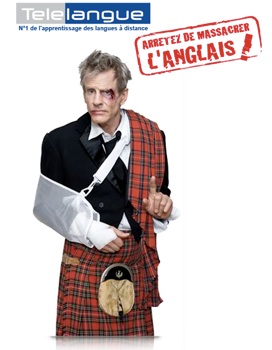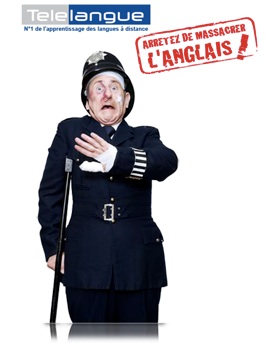
inter alia
1/21/09





I have now watched an episode of Dexter, and updated accordingly. Changes are in Helvetica Light or in strikethrough. No big changes, though.
I just dropped Sasha off at school, and got to ride one of the really nice, ultramodern metro trains on the 2 line, from his stop (Courcelles) to where I change to the 4 line, at Barbés-Rochechouart (try saying that three times fast!). These more modern cars are nice for a number of reasons: they have huge windows; deeper, comfier seats (including the folding ones); and, of course, they’re cleaner. But what is particularly nice about them is that they speak the names of the stops: that’s key in France, because it’s almost impossible to know in advance how to pronounce a place name. You normally don’t pronounce final consonants (with the sometimes exception of c, r, f and l, the so-called careful consonants), so how else would you know that the final s in Barbés is pronounced? But a cool and yet appealing French woman’s voice lets you know—at least on the 2 line!
But that is not the impressive part. Lots of subway systems do that—hell, even some buses do that. The French are not going to let their metro be upstaged by a bus. In general, they like putting a lot of attention and care into things. So, here’s the thing: the voice repeats the name of the stop, once as you’re approaching it, and once again as the train has stopped and the doors are about to open. The kicker is that the recording is different for the two repetitions. “Anvers,” she says the first time, with a slight uptick in pitch at the end, an expectation of things to come. “Avers,” she says the second time, decisively and firmly, with a drop down: you have arrived, and have no doubts about it, you have arrived at the Anvers stop. Every single stop has two recordings, barely different, each precisely cued to show the traveller how they are supposed to feel in relation to the stop. Now that’s someone paying attention to the details.
What do you do on the metro when you have no book and left your iPhone earbuds at home? You read all the ads and wonder about the grammar, the meaning and the ideology, of course! And occasionally, you think that you may have found something new to work on. For example, there are huge (20 feet tall or more) ads for Dexter in all of the stations. They look like this:

Eye catching, no? The French ads all have the catchphrase La série dont le gentil est le méchant on the poster—“The series where the good guy is the bad guy,” more or less. After you’ve seen the poster fifty or sixty times, you start to wonder about Dexter. I had never heard of the show (which appears to be more popular here in Europe than in the States), but I was intrigued by the synopsis I read on Wikipedia—the premise is both clever and ridiculous. Dexter is a serial killer, and yet a good guy. Every serial killer has his “factor,” as Žižek would say, his fetish or his trauma, the thing that he must compulsively enact and re-enact, again and again. Buffalo Bill has a thing for moths and wants the skin of a girl for his transsexual fantasies; Hannibal Lecter has much more refined tastes that center around… very fresh meat, shall we say? In any case, while some serial killers might target couples alone, or prostitutes, or whatever, Dexter’s particular twist is that he only kills… wait for it… other serial killers.
Okay. Not bad. I’ll give it clever. But there is a further twist, one that heads toward the ridiculous (but more about that in a moment): Dexter’s father foster father, cop extraordinaire, detected in his son the seeds of future serial killerdom, and—loving his son but hating crime—directed these sociopathic tendencies toward the service of good. Or more like: well, he’s going to be a killer—so I guess he might as well kill other killers.
There are already a couple of things about this that are fascinating. One is that it explicitly posits what Žižek calls “the obscene reverse side of the law.” Dexter openly admits that the law wishes to turn a smiling, handsome and charming face toward the world, but in reality conceals a bloodthirsty love of violence that is identical to that of the criminals it pursues. Perhaps greater. Or again, look: there are always going to be psychopaths who will love violence and killing. Perhaps we should organize them into some kind of group that can focus all that sociopathy in a positive direction. Let’s call them the police. (Dexter is, of course, a police officer by day.) (Dexter is, as is most typical for modern detective shows, a “para-authority”: he is not precisely police, but he is not not police, either: he is a forensics worker, an expert consultant to the police—but the point about the obscene reverse of the law still stands, perhaps even more so: Dexter is better at his job than the fumbling police officers around him precisely because he is what an officer should be, a murderous criminal.)
The second point of fascination I’ve already touched on—it’s all about enjoyment. The serial killer’s insistence on the fetish (I need not merely to kill, but to kill one-legged prostitutes with German accents!) betrays something rather uncanny about the audience that watches: they are the ones with a real fetish: indeed, a fetish for serial killers! Does this sound familiar? In other words, Dexter’s perversion that has been warped into a socially acceptable form is nothing more or less than the audience’s perverse fascination with serial killers and their elaborately orchestrated scenes of torture and gruesome violence—equally warped into a socially acceptable form: watching TV.
Finally, I couldn’t help but enjoy the title of episode 9, season 1: “Father Knows Best.” This is a reference, of course, to one of the most emblematic moments of what Lacanians think of as the “culture of prohibition,” the one that instantiated the father as the ultimate symbolic authority, the one that you must emulate, but can never live up to (you must be like the father, you cannot be like the father). This symbolic father, so pertinent for Freud, has gradually been effaced and replaced by the father of enjoyment, the perverse, debauched father so typical of David Lynch’s films, what Žižek sometimes calls the “anal father.” This is the father who is weak, grasping, greedy, ineffective. (Watch any advertisement with a couple in it today, and you’ll find a moderately attractive and fairly well put-together woman coupled with an incompetent, chubby and balding boob. He will make a catastrophically clumsy attempt to do laundry, and then she’ll show him how easy it is with New Improved Tide!) In the 1950s era of Father Knows Best, such a depiction of male authority was literally unimaginable, but New Lacanians like Žižek or Todd McGowan (or myself?) see a shift from the old symbolic father or prohibition to the new anal father as part of a turn to a culture that prizes enjoyment (you must enjoy!) above all. (The real theoretical turn that’s waiting, it seems to me, is to couple that psychoanalytic register to a Marxist one, and point out that the culture of the weak father and enjoyment is actually produced by neoliberal, globalized flows of capital. Perhaps that’s coming in a future post.) But to return to Dexter, the real cleverness of invoking Father Knows Best is doing so ironically and even perversely: in the 1950s series, father knew best how to be honest, hardworking, prudent and law-abiding. In Dexter, father knows best how to manipulate Dexter’s perverse sociopathy. I believe that trope is called “irony”?
Perhaps you’re thinking that this is me just riffing on Žižek, the way that I sometimes do. Sometimes I worry about that, too, especially as my metro stop is approaching. But then I get home and start downloading Dexter and discover the French title of episode 9, season 1. How do the French call an episode that explicitly references a charming bit of 1950s Americana that’s probably unknown here? The title is: “Le nom du père.” I kid you not.
Now I have to go through the drudgery of actually watching the show another episode.

This post is already long enough, but I’ll just leave you with another set of ads that caught my interest. Each features an image of a badly injured Englishman (this is for you, Manuel!) looking miserable and frightened. The stamp reads: “arretez de massacrer l’anglais” which can cleverly mean either: “Stop massacring English,” or “Stop massacring the Englishman.” It’s an ad for a language school, and those are all over the subways, all promising “Wall Street English.” This ad is particularly clever not for its language play, but for the way in which it simultaneously recognizes the necessity of English (and not French) in a world of global markets, and delivers an image of the humiliated and abused English body as a kind of symbolic recompense for that secondary linguistic status. Obviously, they’ve never heard a Scotsman speaking English before.


One truly last point—there are dozens of ads in every metro car for English language lessons. Not surprising. There are none for French. And this is in a city where a vast percentage of the population is immigrant. So what’s up with that?
This is my brain on the metro (UPDATED)
Webcomics
They’re where I get all my great ideas. This course will be offered Spring of 2010, and these are the only two required readings. I will write my article on the topic without having read either of them.







